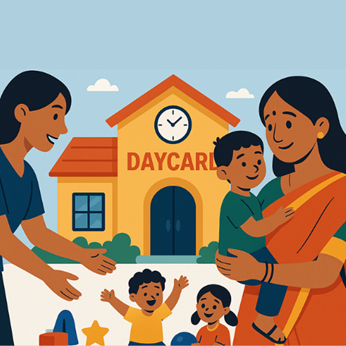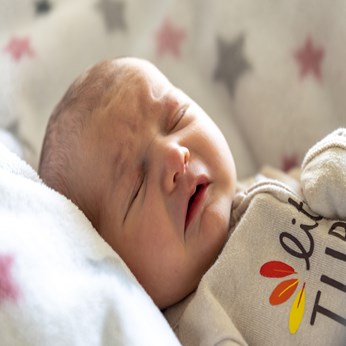Pains in a growing child - How to help your baby overcome it
Typical growing pains in childhood like sharp, throbbing pain in the legs occurring at night or late afternoon is real and in a majority of cases do not require any physical treatment and would automatically disappear by the morning. Affecting 25 to 40% of the children between 3 to 5 and those in the age group of 8 to 12years, these pains that hurt are a part of childhood and could benefit with reassurance, gentle touch and attention of parents like us.
It is to be understood these pains could be the result of excessive physical activity and would go off in the morning; however persistent aches with tenderness or swelling in the joints, fever or rash, limping and weakness is to be taken seriously.
Some French researchers opine that a newborn can be calmed with a spoonful of sugar and a sucking on a dummy, with the dummy having more calming effect than sugar water or sucrose solution. It is found that sweet solutions activated the painkillers occurring naturally in the body, with the dummy diverting the baby’s attention from the pain, with the combination of the two working better. However this research considered only newborn babies that were toothless and would not risk dental decay.

Treat your child’s typical growing pains by first massaging the area till the pain is gone; the application of a heating pad to the area also worked. Ultimately the pain would go away when you help the child to gently stretch or flex the affected area. Severe growing pain can also be treated with over-the-counter analgesics like ibuprofen or acetaminophen; avoid aspirin in children under the age of 12.
Pay close attention to the child’s reaction to these techniques; if the child is not reassured or calmed by your touch and there is excessive tenderness or sensitivity in the joint or a painful reaction to even gentle touches, promptly consult a pediatrician.
Growing pains are quite different from rapid growth occurring around puberty that occurs due to increased bone growth outpacing muscle and tendon flexibility. It causes new stresses on attachments to certain growth areas on the bone causing pain and swelling that could also interfere with activities and sports. Causing inflammation of growth plates, the pain fluctuates for 2 to 3 years and affects knee and heel. Relief could be got by flexibility exercises, local ice application, and altering activities during the painful days.
A persistent and chronic complaint of severe pain with swollen joints, pain associated with particular injuries, and accompanied by fever with redness and rash in the aching area that interferes with a child’s normal activities requires immediate consultation with a pediatrician. You would also find in some cases the child may limp, have difficulty in walking and weakness of the arms and legs.
Also consult your pediatrician in the following conditions:
Juvenile arthritis that presents itself with symptoms like persistent limping, swelling of ankles, wrists and other joints, lethargy, and pain in the joints. He will refer you to a rheumatologist.

Lyme disease, a tick-borne summer illness in your children that involves being attentive to tick bites or implanted ticks on your children.
In rare diseases and conditions like lupus, scleroderma, and fibromyalgia that requires prompt referral to a specialist.
Common growth disorders:
Common growth disorders could be a child growing too quickly or too slowly; early diagnosis could lead to easy treatment.
Too rapid growth of arms, legs or jaw bones indicates a tumor on the pituitary gland that regulates growth hormones; it could be treated by hormones or surgery.
Too slow growth, a hormonal imbalance problem can be detected with blood tests and treated with hormones.
A child’s growth could also be affected by parental genetics; your physician would be the best to advice you.
A child’s growth and development could also be affected by drugs or alcohol abuse of the mother; your physician should be informed of any history of substance abuse during pregnancy.
You sure know the growing pains of your child and must have helped overcome them.
Image Courtesy: Google
Take the next step toward your goals
Share your requirement and find the best care providers in your area
-
Looking for a caretaker’s job? Build your profile and get in touch with families in your vicinity.
-
Discover nannies, babysitters, cooks, housekeepers, pet sitters, and elder care under one roof.
-
Get all the support you need to run a successful care center.
-
Search for appropriate centers near you depending on your needs.
Care Corner Insights: Blog Library

Deep Cleaning Your House: Room-by-Room Checklist for a Thorough Clean
A sparkling clean home isn’t just about looks—it’s about health, comfort, and peace of mind. Whether you’re prepping for a festival, hosting guests, or just tired of the clutter, a deep clean can transform your space. But where do you start? Here’s a

What are Senior Apartments? Experts Explain Independent Living for Older Adults
As we age, our needs and lifestyles evolve—but one thing remains constant: the desire for independence. Senior apartments are designed precisely with this in mind, offering older adults a living arrangement that balances freedom with comfort, safety,

Baby Sleep Problems: What is Sleep Regression and How to Handle It
If you’re a parent, you know that baby sleep is one of the greatest mysteries of life. One day your little one is snoozing like an angel, and the next day they’re suddenly waking up every hour, fussing, or refusing to nap. Before you panic, there’s a

Daycare Admissions in Cary, NC for New NRI Families: Documents, Health Records, and Start Dates
Moving to a new country is exciting but also comes with many responsibilities—especially when it comes to finding the right daycare for your little one. For new NRI (Non-Resident Indian) families settling in Cary, NC, understanding the daycare

Overnight Babysitters in Bellevue, WA for Business-Travelling NRI Parents: Safety & Policies
For many NRI parents living in Bellevue, WA, frequent business trips are a reality. While traveling, one of the biggest concerns is ensuring your children are safe, cared for, and emotionally supported during overnight stays. Overnight babysitters ca

Indian Home-Style Cooks in Queens, NY: Tiffin-Style Weekly Meal Prep from Your Kitchen
Queens, NY, is home to one of the most diverse food cultures in the country, and Indian cuisine holds a special place among families looking for authentic, comforting meals. While restaurant takeout is convenient, nothing compares to the taste and nu

Baby Sleep Problems: What is Sleep Regression and How to Handle It
If you’re a parent, you know that baby sleep is one of the greatest mysteries of life. One day your little one is snoozing like an angel, and the next day they’re suddenly waking up every hour, fussing, or refusing to nap. Before you panic, there’s a

What is Validation Therapy? A New Approach to Dementia Care
Caring for loved ones with dementia is one of the most emotionally challenging journeys a family can face. Traditional methods often focus on correcting memory lapses or redirecting confused thoughts—but that can sometimes lead to frustration, stress

What is a Part-Time Nanny and Do You Need One
Parenting is a beautiful journey, but let’s be honest—it can also be exhausting! Between work deadlines, household chores, and family responsibilities, sometimes there just aren’t enough hours in a day. That’s where part-time nannies step in, offerin

Part-Time Housekeeper Hiring in Alpharetta, GA: Weekly Schedules, Pricing, and Must-Do Tasks
Keeping a home spotless while balancing work, family, and personal commitments can be overwhelming. For families and professionals in Alpharetta, GA, hiring a part-time housekeeper is one of the most practical solutions. Whether you need help once a